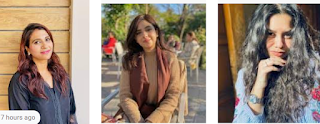UNDP and a call for bolder decisions for climate justice from Asia
Dr. Jassim Taqui
DG Al-Bab Institute for Strategic Studies
Islamabad, October
31, 2021: United Nations Development Programme representatives from eight
Asian countries have called on world leaders to take bold action to ensure
climate justice for highly vulnerable developing states.
They were speaking at the ‘Asian Pre-COP26 Dialogue’ hosted by
UNDP Nepal on Friday 29 October 2021, from Namche, which lies in the shadow of
Mount Everest, nearly 3600 meters above sea level.
The event brought together heads of UNDP from Bhutan, India, Thailand,
Pakistan, Laos, Maldives, and Mongolia. Over 200 development experts and
climate practitioners joined the discussion to exchange country-level
experiences, challenges, and innovative solutions, to tackle the climate
crisis.
“We are at crossroads now. The world is on a pathway to exceed 2.7
degrees in global warming. It is time to join forces, express solidarity, and
make our voices heard,” said Kanni Wignaraja, UNDP’s Assistant
Secretary-General and the Director of its Regional Bureau for Asia and the
Pacific. “Let’s say it out loud: Do not choose extinction!”
The dialogue concluded with a strong and common message: We need
bolder decisions and partnerships for climate justice, particularly climate and
sustainable development finance. Such financing would help poorer and
vulnerable countries that have done little to contribute to the climate
crisis.
The dialogue also emphasized the need for countries to make strong
national climate pledges and step up their climate ambitions, as expressed through
their “Nationally Determined Contributions” (NDCs), cut emissions, and achieve
the Paris Agreement goals.
“We are borrowing our carbon budget from our children and
grandchildren. It is the youth of today that will suffer as a direct
implication of our inaction and unwillingness to step up global climate
action,” UNDP Nepal RR Ayshanie Medagangoda Labe. “Nepalis of yesterday did not
borrow so much of today's Nepalis' carbon footprint, so today's Nepalis have
the same duty to tomorrow’s Nepalis, as advocating and investing for climate
harmony is everybody’s responsibility.”
“The Himalaya is one of the most beautiful parts of the world but
also severely affected by the Climate Emergency. Yet in Ladakh, India,
local communities are showing how to live in a harmony with nature and practice
sustainable lifestyles. We must learn from them to leave a green and healthy
planet, for our future generations,” said Shoko Noda, Resident Representative,
UNDP India.
“The world largest economies are still spending disproportionate
amounts of resources on fossil fuel subsidies that are putting our climate at
risk of the 1.5 degrees tipping point,” said Enrico Gaveglia, UNDP Resident
Representative in the Maldives. “This is a death sentence for Small Island
Developing States such as the Maldives, who are already living in a climate
crisis. It’s time to bring in fossil fuel subsidy reforms and unlock climate
finance to help our planet survive, with people on it. It’s now or
never.”
“Mongolia is faced with intensifying desertification and
biodiversity loss. In response, the government has committed 1% of its GDP to
combat climate change and deforestation, to plant one billion trees by 2030.
Community engagement is essential to achieve a green, inclusive, and
sustainable future,” said Elaine Conkievich, UNDP Resident Representative
Mongolia. “Climate change and inequality are inextricably linked, as it is poor
and vulnerable people who will mostly pay the price of inaction. COVID-19
presents an opportunity for governments across the globe to act now to prevent
the devastating consequences of climate change.”
“We often talk about climate change as something that will happen
in the future, but in northern Pakistan, it is already happening. Regular
disasters are hitting many villages, caused by Glacier Lake Outburst Floods
(GLOFs),” said Knut Ostby, UNDP Resident Representative Pakistan. “UNDP is
supporting the Government of Pakistan and the local community to respond to
this situation. Climate change is here. And we need to take action and address
this right now.”
“Though not a net contributor to climate change, Lao PDR is
heavily impacted by it. To combat desertification and restore degraded land and
soil, including land affected by droughts and floods; UNDP and the Global
Environment Facility is supporting the government in the implementation of the
SAFE-Ecosystems project, to not only help increase the forest cover but also
protect the endangered Eld’s Deer and biodiversity, together with the
livelihoods of the people,” said Ricarda Rieger, UNDP Resident Representative
in Lao PDR.
“Although Bhutan is carbon neutral, warming global temperatures
are directly affecting all aspects of life. As a small and mountainous country,
Bhutan is stepping up its climate ambition through the second NDC, but it
cannot solve the climate crisis on its own,” said Azusa Kubota, Resident
Representative, UNDP Bhutan. “The countries with financial and technical
capacity need to step up to honor the Paris Agreement. The COP26 will be a
platform to make decisive commitments towards zero-carbon futures.”
“With Thailand located in the monsoon region, it is highly
susceptible to extreme climate events, such as sea-level rise, flooding,
cyclones, and erosion. Climate change is impacting local tourism, agriculture,
fisheries and aquaculture, and natural resources while creating additional
stress on land and water resources,” said UNDP Resident Representative Renaud
Meyer. “To address climate change, it is critical to implement community-based
solutions working collaboratively with the public and private sectors.”










